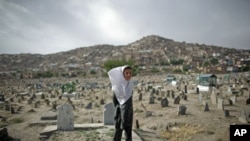As U.S. politicians review the American policy in Afghanistan in advance of an expected drawdown of troops next month, many Afghanis wonder about the future of international efforts in their country.
Many Afghans watched with concern as the U.S. Congress debated the future of international assistance in the war-ravaged nation.
The congressional report presented Wednesday about Afghanistan and the appointment hearings for the nominee for U.S. Ambassador to the country, Ryan Crocker, are both events leading the news in Afghanistan.
Worries of a premature departure
Many Afghans, especially in the capital Kabul, are worried that the West may leave too quickly and abandon them, like the U.S. did after the Soviet withdrawal in 1989. A development that ultimately led to civil war and the rise of the Taliban.
Sayid Mohammed Azam, a Kabul businessman and former official in the Afghan government, warns that if the West leaves too quickly, it all could happen again.
"It will be the same situation as soon as the pro-communist government collapsed in Afghanistan," said Azam. "The Soviet troops withdrew and there was no, you know, strong administration to fill the gap. And the country went into chaos and civil war. At the end of the day, the emergence of the Taliban… so they not only destroyed our country, but they also pose a great security threat and well being of the world community."
The report on Afghanistan, delivered Wednesday by the Senate Foreign Relations Committee in Washington, D.C., also warned of a collapse if the departure of the West is too abrupt.
Cost effectiveness, corruption concerns
It also reported that little has been achieved, however, in the effort to establish a strong government and civil society in Afghanistan that could stand on it’s own. This is despite nearly $19 billion spent over the last 10 years.
The report says the U.S. government's spending often has overwhelmed the local Afghan economies and fostered corruption.
Many also argue, though, that it isn’t just Afghans who are guilty of pocketing money that is intended to build up the impoverished, wartorn and remote country. As Kabul student Mohammed Iqbal sees it, those who came from abroad are equally corrupt and to blame.
"Corruption is all over Afghanistan," he said. "Including, our government and also the foreigners which came here."
Some Afghans who spoke to VOA also expressed criticism that the foreign community does little to provide long-term opportunities for them, instead focusing too much on security or war fighting.
Hopes for improvement
For businessman Azam, the fact that the West is focusing on these issues is a positive, and hopefully both sides will improve.
"I think this report that was prepared by the congress is very helpful; I hope this attention brings positive changes," he said. "We could and we can do a lot of more things, and more effectively and far better."
A day after the congressional report and hearings, and following a phone conversation with President Barack Obama, the Afghan government of President Hamid Karzai did announce they would be forming a commission to look into corruption and spending.
Karzai is scheduled to travel soon to Pakistan for a two-day visit to discuss regional talks aimed at a peaceful resolution of the conflict. It is widely believed that will include some sort of negotiation with some elements of the Taliban.
But many military commanders say those talks must be held from a position of strength. At a meeting in Brussels on Thursday, some NATO defense ministers warned that if the U.S. pulls a significant number of its troops, exactly at a time when there are gains being made on the ground, it could lead to disaster in Afghanistan.
Some Afghans Fear Early US Departure














